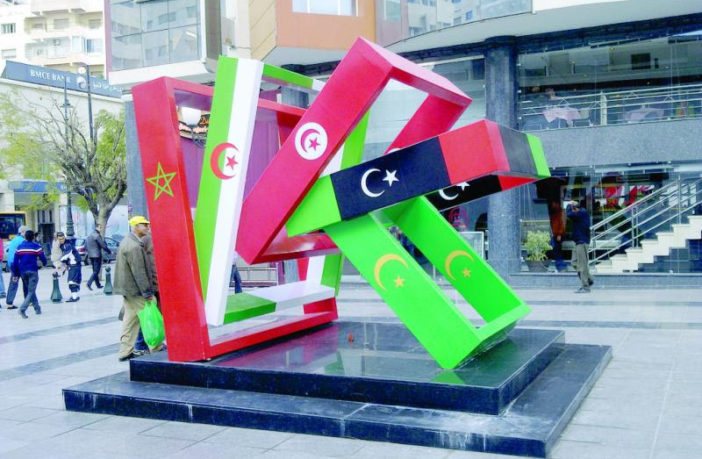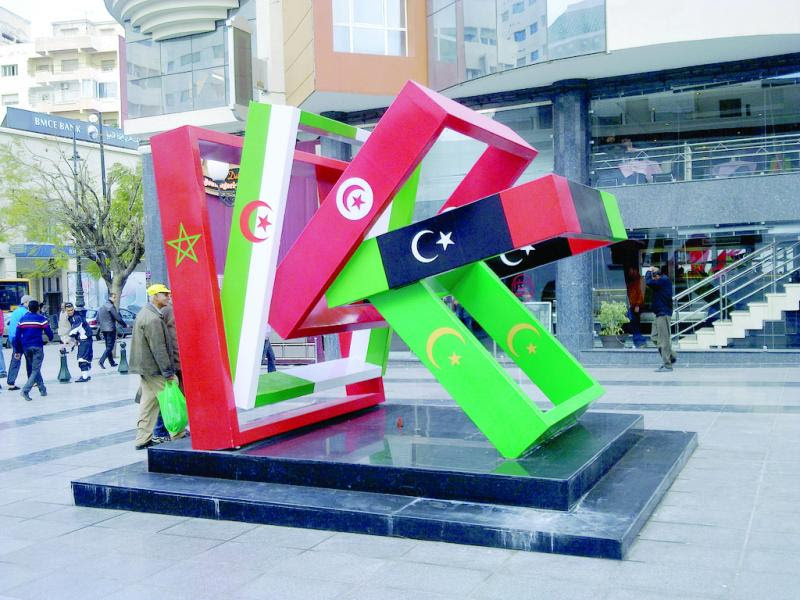The Arab Weekly
Lamine Ghanmi
The parties set up a coordination body, which conspicuously avoided the phrase ‘Arab Maghreb’ .
TUNIS – Leaders of 11 progressive and secularist political parties from Algeria, Libya, Mauritania, Morocco and Tunisia completed a two-day brainstorming session focused on breathing new life into the 29-year-old Arab Maghreb Union.
Their main challenge will be boosting support for the North African grouping amid widespread disappointment with its performance.
The parties set up a coordination body, dubbed the “Network of Democratic Parties in North Africa,” which conspicuously avoided the phrase “Arab Maghreb” and its identity implications. The shift was in line with social and cultural changes since the “Arab spring” in 2011, after which Algeria and Morocco recognised the Berber language and identity in their constitutions.
Morocco’s constitution identifies the country as part of the “Great Maghreb” rather than the “Arab Maghreb.” This came in response to concerns from Berber activists that identifying the region as “Arab” was racially insensitive, marginalising the estimated 35 million Berber-speakers in the Maghreb, including in Libya and Mauritania.
Identified mainly by their native languages, the Berbers are indigenous inhabitants of North Africa. Their culture was predominant in the Maghreb prior to the seventh-century Arab conquest and Islamic religious and cultural influence.
The most evident cultural change in the Maghreb has been the Amazighs’ revival in Libya following the fall of Muammar Qaddafi’s regime, which brutally suppressed that culture.
All leaders in the Maghreb stressed the importance of national unity following independence and suppressed efforts to revive the Amazigh language and culture but Qaddafi’s crackdown on Berber cultural expression was particularly harsh as he saw their movement as part of an “imperialist” or “Zionist” plot against pan-Arab unity, which he championed.
The latest North African unity session saw Libya’s Umma Party, Harakat al Moustakbal (Future Movement) and Republican Coalition group join Algeria’s Talaie El Hourriyet (Vanguard of Freedoms), Front El Moustakbal (Future Front) and Rally for Culture and Democracy, as well as Morocco’s pro-royal palace Authenticity and Modernity Party, Socialist Union of Popular Forces and Front of Democratic Forces in the coordination network.
The Rally for Mauritania and Machrou Tounes (Tunisia Project), led by Tunisian President Beji Caid Essebsi’s former top aide Mohsen Marzouk, are also active in the grouping, which is open to other parties in the region. There are more than 210 political parties in Tunisia and 40 political groups in Libya.
“The (network) remains open to all other democratic political parties from all the countries of the region,” the parties said in a statement at the end of their meetings in Sousse, Tunisia.
The purpose of the network will be to “strengthen the cooperation and coordination of the parties, parliamentarians, women, youth, business and cultural groups to reinforce the rapprochement at all levels in the region to further the common interests,” they said.
The parties are to meet in Morocco before the end of the year. The group had its initial meetings in Algeria in March.
“The leaders of the parties pledged to formulate proposals and ideas to face the challenges of the countries in the region and to clear the hurdles that halt the progress and the success of the Maghreb Union,” they added in the final communique, naming terrorism and Islamist extremism as major threats to the region’s stability.
Mohcine Belabbas, leader of Algeria’s Rally for Culture and Democracy party, said: “the path to achieving regional unity appears long but I’m certain that if we succeed in making the initiative popular by reaching out to the other political, social and citizen forces this goal will be within our reach.”
“It is our duty as progressive parties to reaffirm our commitment and ability to open the debate and undertake the necessary action for the integration of the North Africa region as a democratic grouping,” he added.
Islamists are not part of the new Maghrebi network, which is dominated by secularist and progressive-leaning political parties. It is reminiscent of the Etoile Nord-Africaine (North Africa Star) grouping created by Maghrebi progressive nationalists 92 years ago to bolster support for the independence of Algeria, Morocco and Tunisia with the hope the three future independent countries would form a regional union.
The ideals of the North Africa Star remained alive among nationalist leaders, culture and business elites and citizens following independence, which helped lead to the creation of the Arab Maghreb Union in 1989.
The union achieved little, however, to satisfy yearnings for political and economic integration or foster solidarity among the region’s more than 100 million people. Maghrebi intellectuals describe the union as a dormant “syndicate” of governments that are more interested in their own survival than a vision of regional integration and cooperation.
“It has been 29 years since the union was created. What has been achieved so far amounts to nothing,” said Algerian writer Sadek Sahraoui, who is a strong supporter of the revival of the union. “At the political level, what is left is the ritual exchange of messages between its leaders on the anniversary of its creation while each leader really resents the other.”
Written By
Lamine Ghanmi is a veteran Reuters journalist. He has covered North Africa for decades and is based in Tunis.








